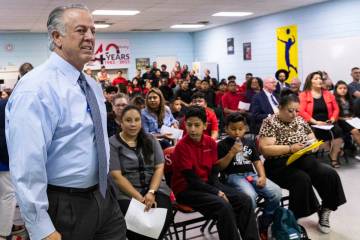STEVE SEBELIUS: Republicans, Democrats agree, disagree on stadium
Strange bedfellows, indeed.
The vote tallies for Senate Bill 1, the Oakland A’s stadium financing plan, probably featured the most bizarre matchups seen in Carson City this session. Or rather, session(s), because the bill was approved in an eight-day special on the heels of the regular.
Where else would you see arguably the two most liberal members of the state Senate — Pat Spearman, D-North Las Vegas, and Dallas Harris, D-Las Vegas — on the same side of an issue as conservative Ira Hansen, R-Sparks?
Was it one of those rare instances where the political continuum warps and folds back on itself? Like when conservative libertarians and liberal libertines agree on legalizing drugs, or when pro-police conservatives see like-minded people arrested for rioting at the Capitol and finally start sympathizing with cop-skeptical liberals?
Sort of. Republicans and Democrats in the Legislature had somewhat different reasons for their votes, although there was some overlap.
All told, five Republicans and eight Democrats joined to approve the measure in the Senate, while three Republicans joined five Democrats in voting no.
Harris questioned the assumptions underlying the stadium’s attendance, assumptions that undergird the amount of revenue expected from the special tax district created to repay the stadium’s bonds.
Spearman said she worried that Clark County taxpayers would be on the hook for bond repayments, which is true, but would require every other stadium funding mechanism to fail over a period of years.
Poor Hansen, on the other hand, wondered where his beloved Republican Party had gone, why the invisible hand of the free market wasn’t making the decision as to where to locate a stadium instead of lawmakers. (The invisible hand is apparently in the taxpayers’ wallets, senator!)
“We’re using public dollars to subsidize a private business,” Hansen lamented in a floor speech.
Over in the Assembly, the debate, and the vote, was much the same.
Democrat Lesley Cohen, D-Henderson, touted the economic benefit to the state. (According to projections, that includes more than 8,000 jobs, economic output of $1.3 billion per year when the stadium is up and running and an additional $900 million per year spent by visitors. And that’s before you get to the $2 million in community commitments required by the law.)
But Serena La Rue Hatch, D-Reno, echoed Hansen: “No amount of amendments are going to change the fact that we are giving millions of dollars to a billionaire,” she said, listing some of the other important state priorities that were still unaddressed despite an unusually generous state budget that boosted education funding by more than $2 billion.
In the end, the vote was as mixed as it was in the Senate: 10 Republicans and 15 Democrats voted aye, while four Republicans and 11 Democrats voted no. Two members were absent.
Speaking of amendments, Democrats did force Lombardo to retreat on a couple issues.
After the governor in the regular session vetoed bills which would have required companies that receive tax assistance from the state to provide paid family leave, senators added that back into the A’s bill.
They also included the language of a vetoed measure that removes a prevailing wage exemption for railroads and monorails.
Give the Democrats credit for restraint: If they’d really wanted to test Lombardo, they could have amended the bill to feature a trio of gun control measures the governor vetoed during the regular session, knowing that would force him to veto the A’s bill and extend the special session.
But give Lombardo credit for compromise: He could have sent the A’s bill back because of the family leave and prevailing wage amendments, but he wanted the stadium more than a perfect veto record, and signed the bill on Thursday afternoon notwithstanding the unwelcome additions.
For a long time during the regular session and even the special, proponents of the bill believed they lacked the votes to pass the A’s measure. (To be sure, if it had required a tax increase and thus a two-thirds supermajority, it would have failed in both houses.)
But longtime observers know that when that much juice — organized labor, chambers of commerce, the Nevada Resort Association — and that much money are behind a project, there’s a good chance it will succeed.
Succeed in passing the bill, that is. Whether the stadium is successful, whether the A’s truly become part of the community and whether Las Vegans ultimately embrace them as their own remains to be seen.
Contact Steve Sebelius at SSebelius@reviewjournal.com or 702-383-0253. Follow @SteveSebelius on Twitter.























